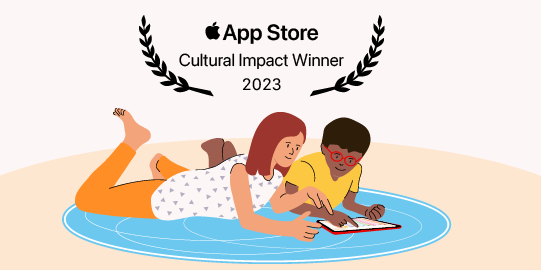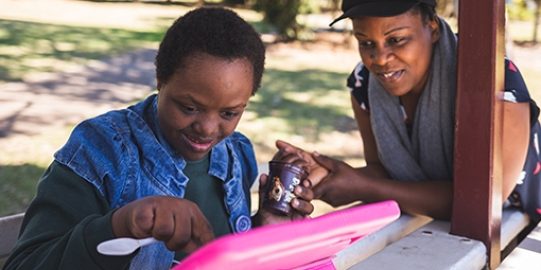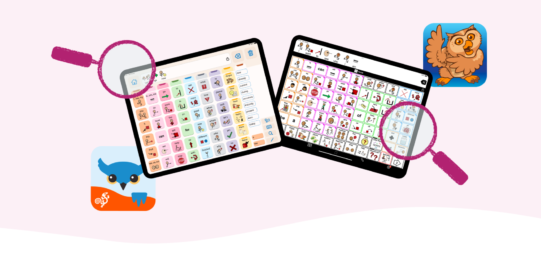Over the past 25 years, ATIA has been a community gathering for Assistive Technology practitioners, teachers, parents and caregivers, persons with disabilities and more to learn, network, and share on the best in Assistive Technology.
Our sessions at ATIA 2025
Redefining AAC Assessment: A Strengths-Based Approach for Early Communicators
Presenters: Euan and Rachael
Date: Thursday, January 30 | Time: 1:00 PM - 2:00 PM | Location: Miami
Children with the earliest communication skills are often the most difficult to assess when it comes to language development. Traditional forms of assessment fail to capture meaningful forms of emergent communication, including pre-linguistic behaviors such as visual attention, facial expressions, and movements. This session will explore tools and strategies for assessing meaningful emergent communication skills, as well as practical ideas for tracking growth. Participants will leave this session understanding the strengths and limits of both standardized and alternative forms of assessment, along with examples of ways to measure language progress among emergent communicators.
It’s Not About Accuracy: Writing Quality Goals for Emergent Communicators
Presenters: Rachael and Euan
Date: Thursday, January 30 | Time: 2:15 PM - 3:15 PM | Location: Miami
Emergent communicators often pose the biggest challenge to classroom teams. These students are often learning language through AAC and they need learning goals that are both relevant and attainable. Students with emerging skills often make progress in small increments, so we need tools that capture those smallest gains. Instead of relying on mastery criteria, we will discuss goals that target increased duration of attention, increased engagement, or improved levels of participation in classroom activities. We will explore goal-writing from a supportive, strengths-based lens while offering tools and resources for participants to share with their teams.
Early Language and “Motherese”: Are We Approaching AAC Modeling All Wrong?
Presenters: Erin and David
Date: Thursday, January 30 | Time: 4:30 PM - 5:30 PM | Location: Miami
The language of young children progresses through a predictable sequence of stages. Infant-directed speech, or “motherese,” is an important scaffold to this development. But what happens when a young child does not develop speech, and we introduce AAC? Are common AAC interventions consistent with the role of motherese? And what are the implications if AAC is introduced only after critical developmental windows have closed? Come join this session for a deep dive into the insights we can glean from the role of motherese in early language development and its implications for AAC modeling.
Measuring AAC User Linguistic Competence: A Novel Approach
Presenters: David and Erin
Date: Friday, January 31 | Time: 8:30 AM - 9:30 AM | Location: Miami
This session explores how to measure linguistic competence for language produced with an AAC system. We analyzed anonymous language use data from over 30,000 symbol-supported and text-based AAC systems. We found that Mean Length of Utterance (MLU), the current go to method, is not very suitable for AAC. In this session we will present a number of alternative measures covering the syntactic, semantic, morphological, and phonological components of linguistic competence while respecting AAC user privacy. Join us to learn about new robust ways to measure linguistic competence that work equally well for emergent and advanced users.
Classroom of the Future - How Can AAC Turbocharge Inclusion and Participation
Presenters: Euan
Date: Friday, January 31 | Time: 8:30 AM - 9:30 AM | Location: Magnolia 2
The implementation of AAC in classrooms is a challenge for educators. Developments in teaching practice and a focus on formative assessment and universal design for learning increasingly focus on the benefits of supporting student learning by utilizing visual supports, assessing learning through the use of meaningful questions, and dynamically responding to learning needs in real time by adjusting teaching to fill the gaps. In this session we will examine how educators supporting AAC users can utilize the features of a robust AAC system to supercharge learning.
Elevate Literacy Instruction and AAC with Readtopia and Proloquo
Presenters: Maureen Donnelly and Erin
Date: Friday, January 31 | Time: 9:45 AM - 10:45 AM | Location: Miami
Emergent AAC users need highly effective instruction to learn how to communicate, read and write. A rich, expanding vocabulary is the anchor for comprehending and constructing texts, as well as engaging with the world. But educators struggle to implement comprehensive literacy and vocabulary instruction. Readtopia is an online special education curriculum that teaches phonics and early reading through thematic units, and experiential lessons that integrate literacy with science, social studies and life skills. Proloquo is a robust AAC system uniquely designed to support teaching. This session will demonstrate how pairing Proloquo with Readtopia delivers high quality comprehensive literacy instruction.
Principles of Robust Vocabulary Instruction
Presenters: Erin and Euan
Date: Friday, January 31 | Time: 1:00 PM - 2:00 PM | Location: Miami
Children learn new words and concepts through exposure and explicit teaching. Their word knowledge grows through experimentation and adult feedback. Their category knowledge develops as they learn the meaning of the category label and compare/contrast what fits into the category and what doesn’t. AAC users often miss these developmental opportunities due to late introduction of AAC and an over reliance on the message “just model”. Join this interactive workshop to explore ways to balance explicit instruction with implicit modelling to enhance language development. .
Interactive Tools to Teach Core Vocabulary Through Explicit Symbol Instruction
Presenters: Euan and Rachael
Date: Friday, January 31 | Time: 2:15 PM - 3:15 PM | Location: Miami
AAC modeling implicitly teaches graphic symbols word meanings and uses. But most students also benefit from explicit instruction. This session introduces a simple daily instructional routine borrowed from explicit alphabet instruction (Jones et al., 2012). The routine focuses on recognizing the symbol in isolation; finding the symbol in an array; teaching the word meaning; and combining symbols to create messages. We demonstrate Proloquo’s unique features that allow educators to show and manipulate symbols to minimize lesson preparation. Join us to explore how structured routines paired with robust AAC can enhance student learning.
Ditch the Therapy Script: Using AAC to Promote Engagement & Language Learning
Presenters: Rachael
Date: Friday, January 31 | Time: 4:30 PM - 5:30 PM | Location: Miami
Join this discussion and explore how to embed AAC as a tool to support expressive communication, but also as a dynamic tool for teaching receptive language, word meaning, grammatical language, sentence complexity, and more. This session will demonstrate how AAC provides a visual thinking tool for learners with various language learning needs - from early communicators to those working on more sophisticated language concepts. Rather than creating materials ahead of time, we will talk about how SLPs can use features within Proloquo to adapt a lesson on the spot to promote engagement.
A Framework for Supported Decision-Making Using Interactive AAC
Presenters: Erin and Euan
Date: Saturday, February 1 | Time: 8:30 AM - 9:30 AM | Location: Miami
Many early AAC users are deemed unable to make important decisions due to their level of skill or ability. Supported decision making provides people with communication disabilities the necessary tools and scaffolds to participate in decisions. Communication partners play a vital role in ensuring AAC users are included in decisions that affect them. In this session we will propose a framework of strategies and tools to support beginning communicators to make decisions with the support of trusted advisors. Join this session to identify strategies and tools, including interactive AAC supports, which enable AAC users to influence how decisions are made.
Stepping Out - Co-producing Transition Goals Using Interactive AAC
Presenters: Erin and Euan
Date: Saturday, February 1 | Time: 9:45 AM - 10:45 AM | Location: Miami
Transition is often a source of anxiety and stress for AAC users, their families and the professionals supporting them. It can be difficult determine how to meaningfully involve beginning communicators in their transition journey and establish what is important to them or what worries them the most. Join us in this workshop to learn practical strategies that allow transition teams to co-produce goals and transition plans with AAC users. By utilising interactive AAC tools available in AssistiveWare Proloquo to teach, engage and structure information in a meaningful way.
Family-Centered AAC Support: Insights From the Field
Presenters: Barbara and Erin
Date: Saturday, February 1 | Time: 1:00 PM - 2:00 PM | Location: Miami
Implementing AAC at home is hard work. This session presents AssistiveWare’s original research on the lived experience of parents implementing AAC. We reveal predictable patterns that will help you adapt your approach with different parents and different stages in the AAC journey. You will leave this session with simple, evidence-based strategies to help you build a family’s capacity to support their emergent AAC user. Best yet, these strategies are highly applicable to anyone leading change, such as to professionals focused on implementing AAC within teams of educators, paraprofessionals, or related service personnel such as ABA therapists.
ATIA 2025 Virtual Event - Pre-recorded presentations
AAC as a Tool for Feelings, Regulation and Problem Solving
Presenters: Amanda
Location: Online
Let’s dive into strategies for supporting emotions, regulation and problem solving for people who are nonspeaking. Often people who use AAC are only supported to express very basic feelings - happy, sad and angry. How we feel is far more complex. We need to do more for AAC users. This presentation will help you to personalize the language AAC users need to express how they feel and learn how we can integrate body signals into understanding emotions for AAC users. Get practical strategies for supporting emotional regulation and problem solving. Give AAC users the language for true expression and self advocacy!
5 unique features to enable AAC user participation
Presenters: Euan
Location: Online
AssistiveWare Proloquo is a next generation AAC app offering the largest AAC vocabulary to students of all ages. Embedding a student's AAC in the classroom has often presented a huge challenge to teachers in the field of AAC. Proloquo's robust vocabulary provides educators and speech-language pathologists a unique opportunity to support a student's communication and language whilst also scaffolding their learning. Relevant to educators and speech-language pathologists this workshop will explore 5 features of Proloquo and offer implementation ideas from professionals using the app in their daily lives. Expect to leave with practical ideas to develop in your setting.










